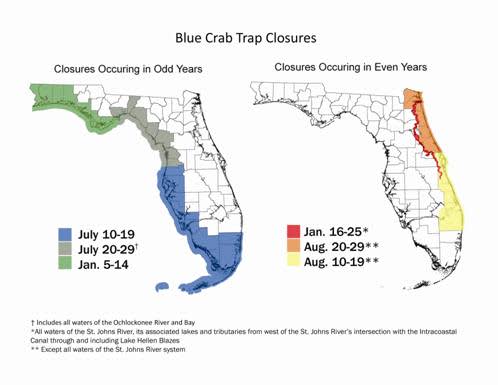Florida East Coast Blue Crab Trap Closure Ending Early

Recreational and commercial blue crab traps may be placed back in the water in certain areas of Florida’s east coast starting Sunday, Aug. 26, four days earlier than scheduled.
The 10-day closure that affects Nassau through Volusia county waters started Aug. 20 and was set to end Aug. 29, but it will reopen four days early because efforts to remove lost and abandoned traps will have been completed.
Lost and abandoned blue crab traps are a problem in the blue crab fishery because, when left in the water, they can continue to trap crabs and fish. They can also be unsightly in the marine environment, damage sensitive habitats and pose navigational hazards to boaters on the water.
The Aug. 20 closure that is ending Aug. 26 includes Nassau, Duval, St. Johns, Flagler and Volusia counties.
There are six regularly scheduled regional closures in total: three occurring in even-numbered years on the east coast and three in odd-numbered years on the west coast (see map).
During the closure, blue crabs may be harvested with other gear, such as dip nets and fold-up traps. Blue crab harvesters may also use standard blue crab traps during the closure as long as the traps are secured to a dock or other private property.
For more information regarding the FWC’s trap-retrieval program, blue crab trap closure dates, regulations and cleanup events, visit MyFWC.com/Fishing (click on “Saltwater Fishing,” then “Trap Retrieval/Debris Removal”).


